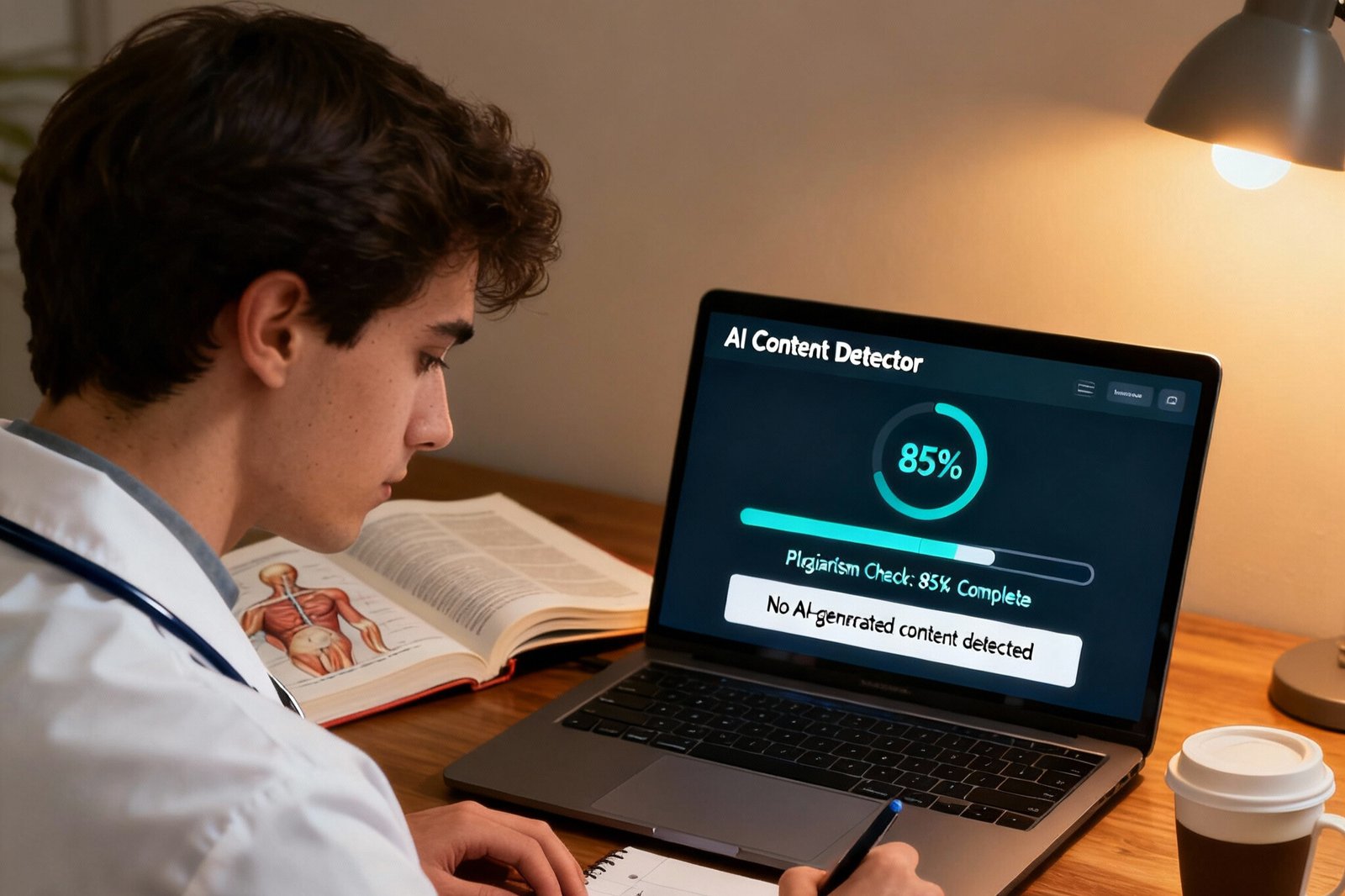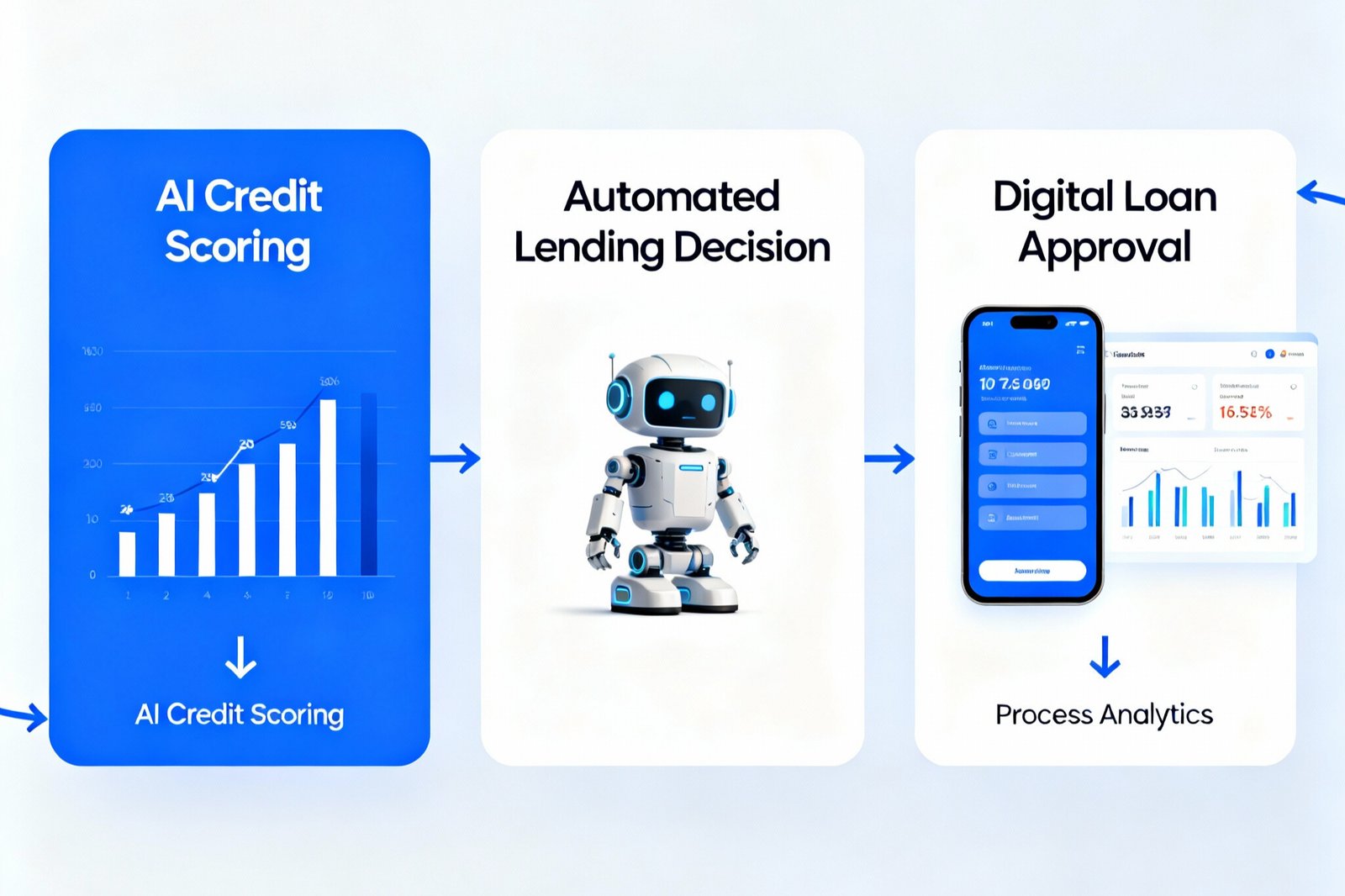The landscape of medical school applications has dramatically shifted with the rise of artificial intelligence. As more students turn to AI tools like ChatGPT for writing assistance, medical schools are responding with sophisticated AI detector systems to identify artificially generated content in essays. Understanding how AI detector med school essays work has become crucial for prospective medical students navigating the admissions process in 2025.
Medical schools are increasingly implementing AI detection technology to maintain the integrity of their application review process, ensuring that personal statements and essays reflect genuine student experiences and authentic voices.
How Medical Schools Use AI Detection Technology
Medical schools have embraced AI detection as a standard practice in their admissions workflow. These institutions deploy specialized software designed to identify patterns typical of AI-generated text, including predictable structures, unusual wording patterns, and vocabulary choices that differ from typical human writing.
The detection process operates at multiple levels. Some medical schools, like the Donald and Barbara Zucker School of Medicine at Hofstra/Northwell, use AI systems as initial application screeners, processing approximately 5,000 applications annually. However, these same institutions also employ separate AI detection tools to flag potentially artificial content in essays and personal statements.
Primary Detection Tools Used by Medical Schools
Medical schools utilize several proven AI detection platforms:
-
GPTZero: Specifically designed to distinguish between human and ChatGPT-written content, showing significantly higher probability scores for AI-generated text
-
Turnitin: Traditional plagiarism detection software now enhanced with AI identification capabilities
-
Originality.ai: Advanced detection software that analyzes text patterns and linguistic markers
-
Custom institutional tools: Many schools develop proprietary systems tailored to their specific needs
Research published in medical education journals indicates that these detection tools can identify AI-generated content with notable accuracy, though their effectiveness varies depending on the sophistication of the AI writing and any subsequent human editing.
What AI Detectors Look for in Medical School Essays
AI detection software analyzes multiple textual elements to identify artificially generated content. Understanding these markers helps explain why AI detector med school essays screening has become so effective.
Linguistic Pattern Analysis
Detection algorithms examine several key indicators:
-
Sentence structure consistency: AI tends to produce more uniform sentence lengths and patterns than human writers
-
Vocabulary complexity: Artificial intelligence often uses unusually sophisticated vocabulary or maintains consistent complexity levels throughout the text
-
Transition patterns: AI-generated text frequently employs predictable transitional phrases and logical progressions
-
Personal narrative authenticity: Detectors analyze whether personal experiences described in essays match typical human storytelling patterns
Statistical Markers
Advanced detection systems evaluate quantitative aspects of writing:
-
Average sentence length variations
-
Readability scores that may indicate artificial generation
-
Frequency of complex vocabulary usage
-
Paragraph structure uniformity
-
Use of specific phrases or expressions common in AI-generated content
Consequences of AI Detection in Medical School Applications
When AI detection systems flag essays or personal statements, medical schools implement various response protocols depending on their institutional policies.
Immediate Review Procedures
Flagged applications typically trigger additional scrutiny from admissions committees. Officers trained in AI detection manually review the content, looking for signs that confirm or contradict the algorithmic assessment. This human verification step ensures that false positives don’t unfairly impact genuine applicants.
Potential Outcomes
The consequences of confirmed AI use in application essays vary significantly:
-
Resubmission requests: Some schools allow applicants to rewrite and resubmit flagged essays
-
Additional verification: Applicants may need to provide writing samples or undergo interviews to demonstrate authentic authorship
-
Application rejection: In severe cases where extensive AI generation is detected, schools may reject applications entirely
-
Waitlist placement: Borderline cases might result in waitlist placement pending further review
Institutional Policy Variations
Different medical schools maintain varying approaches to AI detection and consequences. Some institutions focus on education and second chances, while others implement stricter zero-tolerance policies.
Ethical AI Use Guidelines for Medical School Applicants
Medical schools generally acknowledge that AI tools can serve legitimate purposes in the application process when used appropriately.
Acceptable AI Applications
Most institutions permit AI use for:
-
Grammar and spelling checks: Basic proofreading and error correction
-
Brainstorming assistance: Generating ideas or structural frameworks
-
Style suggestions: Improving sentence flow and readability
-
Research support: Finding relevant information or examples
Prohibited AI Uses
Medical schools typically forbid:
-
Complete essay generation by AI tools
-
Substantial content creation without human input
-
Fabrication of experiences or achievements using AI
-
Replacement of personal narrative voice with artificial alternatives
The key distinction lies in using AI as an assistant while maintaining authentic personal expression and genuine storytelling.
Current Trends in AI Detection Technology
The field of AI detection continues evolving rapidly as both AI writing tools and detection systems advance simultaneously.
Detection Accuracy Improvements
Recent studies in medical education demonstrate that newer detection tools show improved accuracy rates. Research published in the Canadian Medical Education Journal found that current AI detection systems can identify subtle differences between human and AI-generated medical school essays, even when AI tools attempt to mimic human writing patterns.
Integration with Admissions Systems
Medical schools increasingly integrate AI detection capabilities directly into their application management systems. This integration allows for real-time screening during the submission process, potentially alerting applicants to problematic content before final submission.
Machine Learning Adaptations
Detection algorithms continuously learn from new AI writing patterns, adapting to emerging tools and techniques. This ongoing evolution means that AI detector med school essays screening becomes more sophisticated over time.
Impact on Medical School Admissions Process
The implementation of AI detection technology has transformed how medical schools evaluate applications, creating both opportunities and challenges for admissions committees.
Efficiency Gains
AI detection tools enable admissions offices to process larger volumes of applications more efficiently. By automating initial content authenticity screening, human reviewers can focus their attention on substantive evaluation of qualified candidates.
Equity Considerations
Some admissions officers argue that consistent AI screening reduces human bias in application review. Unlike human readers who may experience fatigue or subjective preferences, AI detection systems apply uniform standards to all applications.
Ongoing Challenges
However, the technology also presents concerns about false positives and the potential for legitimate applications to be unfairly flagged. Medical schools must balance efficiency gains with careful human oversight to ensure fair treatment of all applicants.
Future Implications for Medical Education
As AI technology continues advancing, medical schools face ongoing decisions about how to adapt their admissions processes.
Evolving Detection Capabilities
Future AI detection systems will likely become more sophisticated, potentially identifying even subtle AI assistance in essay writing. This technological arms race between AI generation and detection tools will continue shaping application strategies.
Policy Development
Medical schools are developing more nuanced policies that distinguish between different types of AI use. Future guidelines may provide clearer boundaries for acceptable AI assistance while maintaining authenticity requirements.
Alternative Assessment Methods
Some institutions may shift away from traditional essay-based evaluations in favor of alternative assessment methods less susceptible to AI manipulation, such as structured interviews or practical demonstrations.
Conclusion
AI detector med school essays screening represents a significant evolution in medical school admissions processes. As artificial intelligence tools become more prevalent, medical schools have implemented sophisticated detection systems to maintain application integrity and ensure authentic candidate evaluation. Understanding these systems helps prospective medical students navigate the application process while using AI tools appropriately and ethically. The key lies in leveraging artificial intelligence as a supportive tool while preserving the genuine personal narratives and authentic experiences that admissions committees value most.
FAQs
Q1: Do all medical schools use AI detectors for essays?
Most major medical schools now implement some form of AI detection technology for application essays, though specific tools and policies vary by institution.
Q2: Can AI detectors identify all artificially generated content?
While AI detectors are highly accurate, they’re not perfect. Detection rates vary depending on the sophistication of the AI tool used and any subsequent human editing.
Q3: What happens if my essay is falsely flagged as AI-generated?
Medical schools typically have human review processes to verify AI detection results. Applicants can usually provide additional documentation or writing samples to demonstrate authenticity.
Q4: Is it okay to use AI for grammar checking in medical school essays?
Yes, most medical schools permit AI use for basic proofreading, grammar correction, and minor editing, as long as the content and voice remain authentically yours.
Q5:How can I ensure my essay won’t be flagged by AI detectors?
Focus on authentic personal storytelling, vary your sentence structure naturally, and use AI only for minor assistance like proofreading rather than content generation.







Leave a Reply